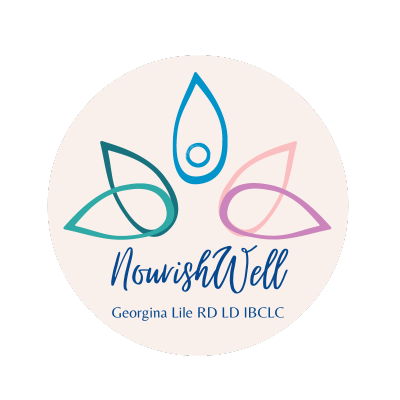Nourishing Women's Health: 7 Nutrition Strategies to Cool Inflammation and Balance Hormones
Introduction: The Role of Food and Inflammation in Women's Hormonal Balance
As a women's health dietitian, I am deeply passionate about uncovering the intricate web of connections between diet, inflammation, and hormonal balance. Our dietary choices play a pivotal role in influencing inflammation levels within the body, which, in turn, profoundly impacts women's hormone health. In this article, we will explore the interplay between diet, inflammation, and women's hormone health, shedding light on how nutrition can be used to support a harmonious and balanced hormonal system.
Understanding Inflammation and Hormones
Before we dive into how diet may impact hormone health, let’s explore inflammation and how it connects to your gynecological health. Inflammation is a natural immune response triggered by various factors such as stress, toxins, and poor dietary choices. While acute inflammation is a vital defense mechanism, chronic inflammation can lead to a range of health issues, including hormone imbalances.
Hormones act as chemical messengers, orchestrating a wide array of bodily functions. In women, hormones regulate menstrual cycles, fertility, mood, and overall well-being. Any disruption to hormonal balance can manifest as irregular periods, fertility challenges, mood disorders, and other women's health issues. Chronic inflammation has been linked to several women's health issues, including:
Polycystic Ovary Syndrome (PCOS)
PCOS is a hormonal disorder characterized by cysts on the ovaries, irregular periods, and elevated androgen levels. Inflammation may contribute to insulin resistance and increased androgen production, exacerbating PCOS symptoms.
Endometriosis
Endometriosis is a condition in which tissue similar to the lining of the uterus grows outside the womb. Inflammation is believed to play a role in the development and progression of endometriosis, leading to pain, infertility, and menstrual irregularities.
Premenstrual Syndrome (PMS)
PMS refers to a range of physical and emotional symptoms experienced by some women before their menstrual cycle. Inflammation may exacerbate PMS symptoms, contributing to bloating, breast tenderness, and mood disturbances.
Infertility
Inflammation can affect fertility by disrupting the functioning of the reproductive organs, interfering with ovulation, diminishing ovarian reserve, reducing egg quality, and impairing the implantation of a fertilized egg.
Menopause
During menopause, a woman's reproductive hormones decline, leading to various symptoms such as hot flashes, night sweats, mood swings, insomnia, and vaginal dryness. Inflammation can intensify these symptoms and impact overall quality of life.
7 Strategies to Improve Inflammation and Balance Hormones with Nutrition
Anti-inflammatory Foods: A diet rich in anti-inflammatory foods can help mitigate chronic inflammation and promote hormone balance. Include plenty of fruits and vegetables, especially those rich in antioxidants and phytochemicals, such as berries, leafy greens, and cruciferous vegetables. Healthy fats, like avocados, nuts, and seeds, provide anti-inflammatory omega-3 fatty acids. Spices like turmeric and ginger also possess potent anti-inflammatory properties.
Balanced Macronutrients: Achieving a balanced intake of macronutrients is crucial for hormone health. Adequate protein intake, from sources such as lean meats, fish, legumes, and tofu, supports hormone synthesis and balances blood sugar levels. Include complex carbohydrates like whole grains and vegetables to provide sustained energy and support hormone production. Healthy fats, such as avocados, olive oil, and fatty fish, aid in hormone production and reduce inflammation.
Blood Sugar Balance: Blood sugar imbalances can contribute to inflammation and disrupt hormone balance. Consume complex carbohydrates, fiber-rich foods, and adequate protein to stabilize blood sugar levels. Avoid or minimize refined sugars, sugary drinks, and processed foods, as they can cause blood sugar spikes and inflammation.
Gut Health: A healthy gut plays a pivotal role in hormone regulation and inflammation control. Include fermented foods like sauerkraut, yogurt, and kefir to support a diverse and balanced gut microbiome. Probiotics and prebiotics, either from food sources or supplements, can promote gut health, reduce inflammation, and enhance hormone balance.
Mindful Eating: Developing a mindful eating practice can positively impact both inflammation and hormone health. Slow down, savor each bite, and pay attention to hunger and fullness cues. Stress management techniques, such as meditation or deep breathing exercises, can reduce stress-related inflammation and support hormonal equilibrium.
Phytoestrogens: Incorporating phytoestrogen-rich foods like flaxseeds, soy, and legumes into the diet can provide plant-based compounds that mimic estrogen in the body. These compounds may help balance hormone levels, particularly during perimenopause and menopause when natural estrogen declines.
Personalized Approach: Every woman's body is unique, and individual nutritional needs may vary. Consulting with a women's health dietitian can provide personalized guidance to address specific concerns and optimize hormone health. A comprehensive evaluation of diet, lifestyle, and hormonal profile can help tailor a diet plan that supports inflammation reduction and hormonal balance.
Conclusion: Embracing Nutrition for Hormonal Balance and Vibrant Well-being
Diet has a profound impact on inflammation and women’s hormone health. By harnessing the power of nutrition, we can positively influence inflammation levels, restore hormonal balance, and support overall well-being. Incorporating anti-inflammatory foods, maintaining macronutrient balance, stabilizing blood sugar levels, nurturing gut health, and practicing mindful eating are all key elements to consider.
Remember, each woman's journey is unique, and it's essential to work with a women's health dietitian or healthcare professional who can provide personalized guidance. Do you want to take charge of your hormonal health? Book an appointment with me. Together, we can embrace the transformative power of nutrition, nourish our bodies, and achieve optimal hormone health for a vibrant and fulfilling life.
